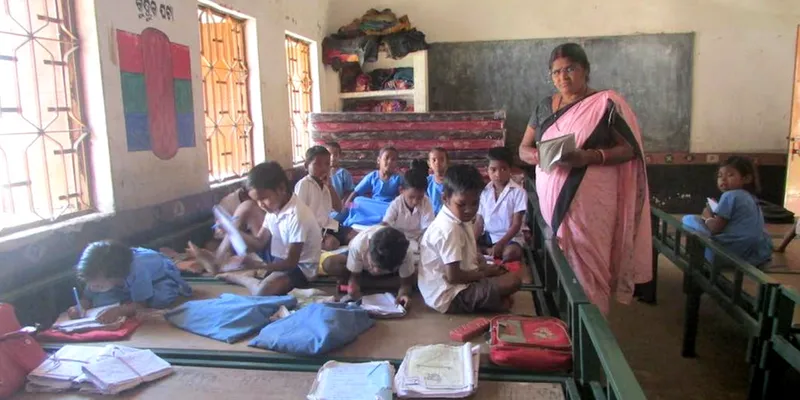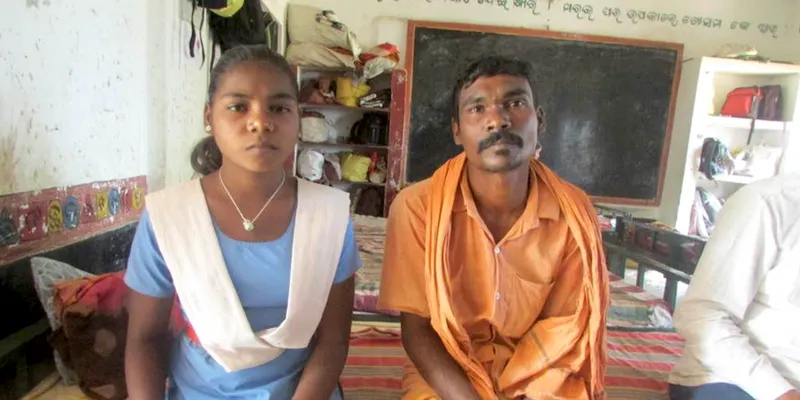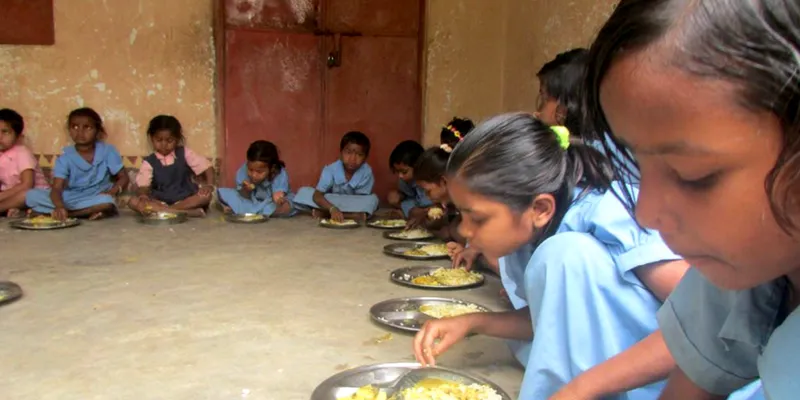How Odisha’s seasonal hostels help curb child migration, child labour
Poor villagers in Odisha’s migration-prone districts, who toil at brick kilns in the southern states for most part of the year, have found some succor in seasonal hostels that educate and nourish their children

Lachhaman Dundi and his parents never thought that Dundi would ever enroll in a college. Hailing from Kotamal village of Khariar administrative block in Nuapada district, he used to accompany his parents as a child labourer to brick kilns in Andhra Pradesh.
While his parents did the arduous work, he flipped bricks so they would dry under the sun. “I used to flip 600-700 bricks daily in the scorching heat and sleep under the sky after a hard day’s work,” Dundi told VillageSquare.in. “We hardly got a full plate of meal.” Dundi had to drop out of school since his parents migrated to other states regularly. He could get back to studies only after his parents learnt about seasonal hostels.
Every year, nearly 3,00,000 people from the area migrate to neighbouring states to work in brick kilns. Children who accompany their parents work as hard as them and suffer verbal and physical abuse, besides suffering from health issues, say organisations working with migrant labourers.
Seasonal hostels in migration prone-districts of Odisha help build the lives of migrant children like Dundi, who are otherwise completely deprived of education.
Children at work
Until a few years ago, parents took their children along, as there was no one to take care of them in the village or because of the pathuria system. Under the pathuria system, labour agents would advance money for so-called units consisting of a couple and one or two children. The children would flip semi-dried bricks or make balls of mud to be moulded.
In brick kilns, as one labourer has to prepare 1,000 bricks per day, he arranges bricks in rows with very little gaps in between. Children can walk between rows easily and flip bricks. Some of the children are dropouts and some have never been to school.
Understanding the vulnerability of migrant children and to retain them in schools, then district collector Santosh Kumar Sarangi and a few activists took the initiative to open community managed residential care centres (CMRCC) in Balangir. These centres later turned into seasonal hostels.
Seasonal hostels
The CMRCCs were opened at migration-prone villages to prevent child migration and child labour, and to retain the children of migrant parents in the fold of education. The small experiment of civil society organisations and district administration in Balangir in 2001-02, became a successful model of retaining children from migrating, besides educating them.

“Earlier, it was difficult to convince parents to leave their children in hostels,” Bhubaneswar Rout, programme officer of Lokadrusti, an NGO that initiated CMRCC in Nuapada district, told VillageSquare.in. “After meeting parents regularly, we accommodated 193 children in seven centres in Khariar block to give them elementary education.”
However, due to fund crunch, it became difficult for the NGO to manage the centre. After the implementation of Right to Education Act, the State government directed Odisha Primary Education Programme Authority (OPEPA) to take over the seasonal hostels. Lokadrusti now provides technical support.
Once exams are over and parents return, schools issue transfer certificates to the migrant children. The government directs source district school administration to re-enroll these migrant children in schools in their respective villages.
Government takeover
“Before opening seasonal hostels, we conduct awareness campaigns in migration-prone villages,” Hrudananda Behera, Additional Block Education Officer-cum-Block Resource Centre Coordinator (ABEO-cum-BRCC), Balangir, told VillageSquare.in.
Apart from existing schools, new schools apply, citing the number of migrant children from their respective villages. The district collector selects the schools that can open new seasonal hostels.
Lokadrusti conducts surveys and has detailed records of those who migrate regularly from each village. Armed with records of those who have taken loans to migrate, Lokadrusti sensitises them about the seasonal hostels so they can enroll the children before migrating.
The education department replicated the seasonal hostel model, which later came under Sarva Shiksha Abhiyan (SSA). Now the seasonal hostels function in four migration-prone districts, namely Balangir, Nuapada, Kalahandi and Bargarh.
Challenges
With lack of adequate rooms in government schools, classrooms double up as hostel rooms. During the day, children sit on the cots and study.
Talking to VillageSquare.in, Aswini Sahu, seasonal hostel coordinator at Lokadrusti, says, “The expenditure per child for six months is about Rs 10,000. But there is no fund allocation for health emergencies.” In some schools, teachers and the NGO staff spend money from their pockets if a child falls ill, and needs to be treated in a private hospital.
After Class VIII, children have to leave. “Some schools retain bright students, helping them complete their matriculation,” said Khem Das, Headmaster, Government Upgrade High School, Mendhala. Bhupendra Singh Punia, Director, OPEPA, says the State government plans to keep them in seasonal hostels till matriculation.
As caretakers belong to the same village and know most of the children, they agree to a salary that is less than the prescribed minimum wage. “We try to convince parents who enroll their children in September, but take them away in January, as they can earn more,” says Behera, adding, “We can’t keep children forcibly.”
Though vulnerable, parents take girls along, as they help with household chores and also work. Harihara Baikar, Headmaster, Government Project Upper Primary School of Talna, says, “Since we opened a hostel in 2005, the enrolment of girls is lower than boys.”
Education and better health
Notwithstanding the challenges, the seasonal hostels have a positive impact on numerous families. A visit to any seasonal hostel will give one an idea of the facilities of food, shelter, study and recreation that the children get. Electricity, water, boundary wall, toilets and minimum three rooms to accommodate children are what authorities look for when selecting a school.
“We ensure these facilities are in place, so that after school, they can watch TV, play indoor games like carrom and ludo, plant trees in the garden, play, dance, eat and pray in the long verandahs,” says Behera. “The objective is to provide them space to nurture their childhood.” In seasonal hostels, children can talk to their parents over phone every Sunday and visit guardians for festivals.

Speaking to VillageSquare.in, Sudarshan Panda, Headmaster, Dudkibahal Project Upper Primary School, says: “While enroling, we record the children’s health status including weight, so that we can pay special attention and give nutritious food if they are malnourished.” They children's weight is recorded when they leave the hostel.
They are fed locally-available vegetables, fruits and snacks regularly, and non-vegetarian food once a week.
“When parents come to take their children, they are surprised to see them healthier, Sanjay Kumar Mishra, activist and former Child Welfare Committee (CWC) Chairperson of Balangir district, told VillageSquare.in. “They work hard at kilns and survive on broken rice and onion.”
Changing lives
“The objective was to educate these migrant children,” Biswanath Tarai, Additional Director, OPEPA, told VillageSquare.in. “Till now, nearly 9,000 children have been accommodated in seasonal hostels.”
Rukmini joined the seasonal hostel of Dudkibahal Project Upper Primary School when she was six. Her father, Upendra Harijan, migrates regularly to work in the brick kilns of Pedapally, in undivided Andhra Pradesh, presently Telangana.
“When Lokadrusti staff told us to enrol our children in seasonal hostels, we agreed because we understand the vulnerabilities our children face at work sites,” he told VillageSquare.in. Proud that his children read and write and keep good health, he wants them to study further.
Tulasi Durya, who is now in Class VIII in Government Upgrade High School in Mendhala in Komna block of Nuapada district, has been in hostel from Class I.
“Initially, I didn’t like staying away from my parents, and I used to cry,” Durya told VillageSquare.in. “But after Class III, I liked the atmosphere, love and affection of our caretaker brother, and the guidance of teachers.” He is sure education will fulfil his dream of joining government service.
There are many success stories of children of migrant parents who had either dropped out or never stepped inside a school. Some like Dundi are pursuing higher studies and many are in private jobs. Some have become teachers, village council members, and government’s day-care centre workers, among others.
Disclaimer: This article was first published in VillageSquare.in. The views expressed by the author are his/her own and do not necessarily reflect that of YourStory's.







